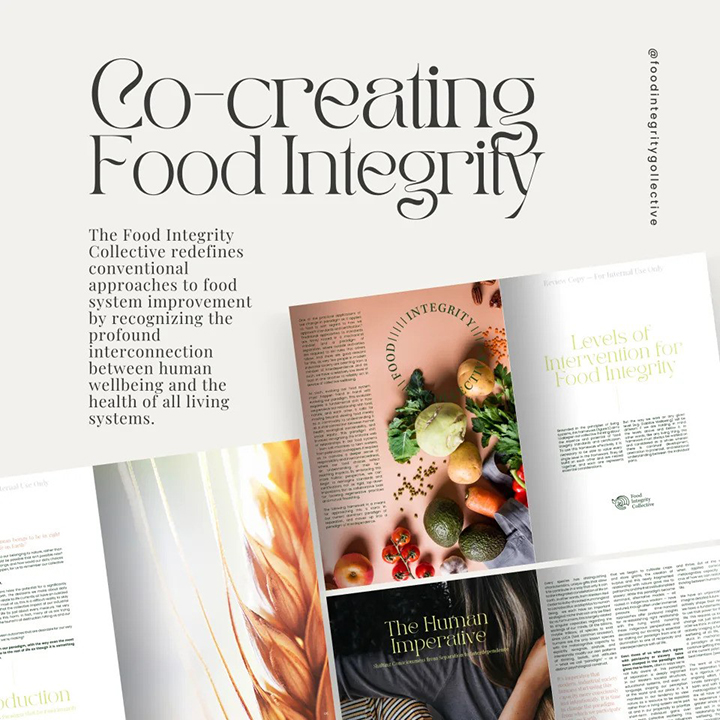Non-GMO Project’s new initiative aims to transform the food system

Published: October 11, 2024
Category: Non-GMO News
Food Integrity Collective’s holistic approach looks to “amplify and unite the critical work of non-GMO, organic, and regenerative agriculture movements”
The Non-GMO Project, recently launched the Food Integrity Collective, an initiative aimed at revolutionizing the retail food system.
Megan Westgate, CEO of the Non-GMO Project, says the Food Integrity Collective “represents a paradigm shift in our approach to food and our relationship with the earth.”
The Food Integrity Collective builds on the success of the Non-GMO Project with its butterfly logo. There are now more than 66,000 Non-GMO Project verified products generating over $45 billion in annual sales.
The Food Integrity Collective aims to redefine conventional approaches to food system improvement by recognizing the profound interconnection between human wellbeing and the health of all living systems. This holistic perspective acknowledges humans’ unique influence on global ecosystems—and the accompanying responsibility this entails. The Collective’s approach encompasses eight essential ‘petals’—from minimal processing and non-GMO practices to regenerative sourcing, healthy human communities, and animal wellbeing—forming a comprehensive framework that focuses on nourishing life at every level of the food system.
The Collective is collaborating with an initial group of brands that are committed to the Food Integrity Collective’s holistic approach to establishing trust, transparency and integrity in the food system. These brands include Atlantic Sea Farms, Califia Farms, GoodSam, Heray Spice, Honey Mama’s, Levelle Nutrition, Pasturebird, Snacktivist, Spicewell, and Tree-Range Farms.
Joni Kindwall-Moore from Snacktivist says, “I am 100% behind Megan and the Non-GMO Project team in their big-picture vision to help align food system activities with transparency and integrity in a way that goes beyond a one-way transaction and down to the bedrock of the supply chains and corporate culture. This is the future of food!”
Ken Roseboro, editor of The Organic & Non-GMO Report recently interviewed Megan Westgate about the Food Integrity Collective.

Megan Westgate, CEO of the Non-GMO Project
What led to the creation of the Food Integrity Collective?
Megan Westgate: I would say that for about six or seven years, we at the Non-GMO Project have been asking ourselves, “How can we make our best possible contribution to the world and to life?” Because these are really challenging times.
We’re proud of what we’ve accomplished with non-GMO and really believe in the importance of our initial mission. But as an organization, we have the capacity and the calling to do even more than that. We explored the possibility of creating some sort of soil health certification, but ultimately in our learning and exploration about regeneration, we have come to a deep understanding of what that is, not just in terms of a set of agricultural practices, but a way of doing business, a way of thinking, a way of being in the world.
What we’ve been learning how to do at the Non-GMO Project for the past few years is how to look at everything as a living system, and it really changes how you do strategy and where you see the important intervention points. Our inquiry into how we can make our best possible contribution has included a deep dive into learning how to apply regenerative living system principles to how we do business and how we think about our work. That is where the Food Integrity Collective (FIC) is coming from.
How does the Food Integrity Collective relate to non-GMO, organic, or regenerative? Does it encompass those?
Megan Westgate: The Food Integrity Collective amplifies and unites the critical work of non-GMO, organic, and regenerative agriculture movements. Rather than replacing or diminishing these essential initiatives, FIC provides a unifying framework that strengthens their impact and relevance in today’s complex food landscape. By contextualizing these crucial certifications within a broader understanding of food integrity, we’re enhancing their power to transform our food system.
FIC has defined Eight Petals of Food Integrity as a starting place, encompassing non-GMO, organic, and regenerative practices alongside other vital aspects of food production and consumption that relate to the interdependent health of all life on Earth. This comprehensive approach aims to elevate the importance of existing standards within a holistic vision of food integrity and a collective eye toward unrealized potential.
How will you engage food brands in the Collective?
Megan Westgate: We’ve initiated brand engagement with a cohort of 10 brands that are passionate about food integrity. Since August, we’ve been meeting monthly to explore how best to support brands in deepening their food integrity journey and communicating their efforts to shoppers and retailers. These pioneering brands are not just participants, but active co-creators in shaping the future of food integrity. Their enthusiasm and insights are invaluable as we work together to develop new benchmarks for trust and transparency in the food system.
A key focus is reimagining how we approach food integrity in a way that goes beyond traditional certification models. We’re exploring innovative ways to showcase a brand’s commitments and practices, providing a more comprehensive and engaging way to build consumer trust.
We’re also planning regular industry webinars on Food Integrity starting in early 2025, which we aim to produce collaboratively with other certifiers, non-profits, and peers in the food integrity space.
While non-GMO is an easier attribute to educate consumers about, FIC seems a little more complex topic to engage consumers. How will you address that?
Megan Westgate: While food integrity might seem more complex than a single attribute like non-GMO, it actually taps into something people intuitively understand and care about—the interconnected health of all living beings. Everyone values feeling well, and a growing percentage of the population understands that food plays a crucial role in wellbeing.
Our approach to education focuses on linking concepts like non-GMO, organic, and regenerative to this broader conversation about health and wellbeing. Food integrity serves as a unifying framework to think about these interconnections.
The stakes are high. Poor diet is responsible for up to 11 million deaths per year globally, accounting for around 20% of all adult deaths. By framing food integrity in terms of its impact on personal and planetary health, we can make these complex ideas more relatable and urgent for consumers.
What is your vision for the Food Integrity Collective, what would you like to see it accomplish?
Megan Westgate: Our vision is to catalyze a paradigm shift in how we approach food systems. We aim to move from a mindset of separation to one of interdependence, recognizing that human wellbeing is inseparable from the wellbeing of all other life on Earth.
Ultimately, we envision FIC as a catalyst for creating a food system that truly nourishes all life, supporting both human and ecological thriving. By leveraging the power of informed consumer choice and collaborative market-based solutions, we believe that, just like we did with non-GMO, together we can drive meaningful change in how our food is produced and consumed.
Our goal is to rekindle our connection to the web of life and rediscover our place within it. Through this collective remembering and realignment, we can open the door to transformative possibilities for the future of life on Earth—not through top-down mandates, but through the collective action of empowered stakeholders throughout the food system.
Organic & Non-GMO Insights October 2024




